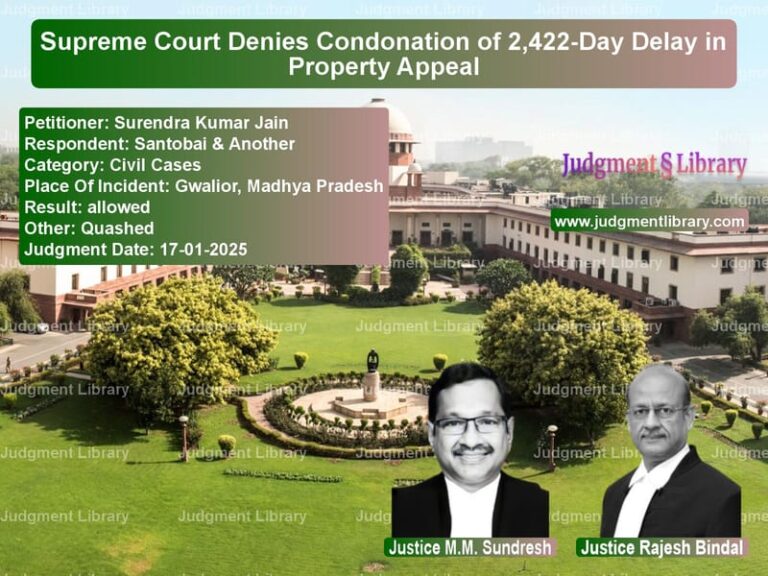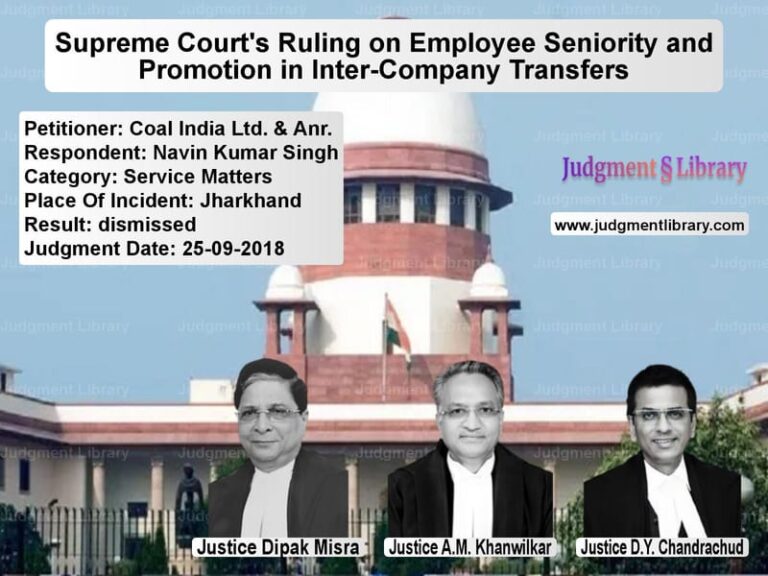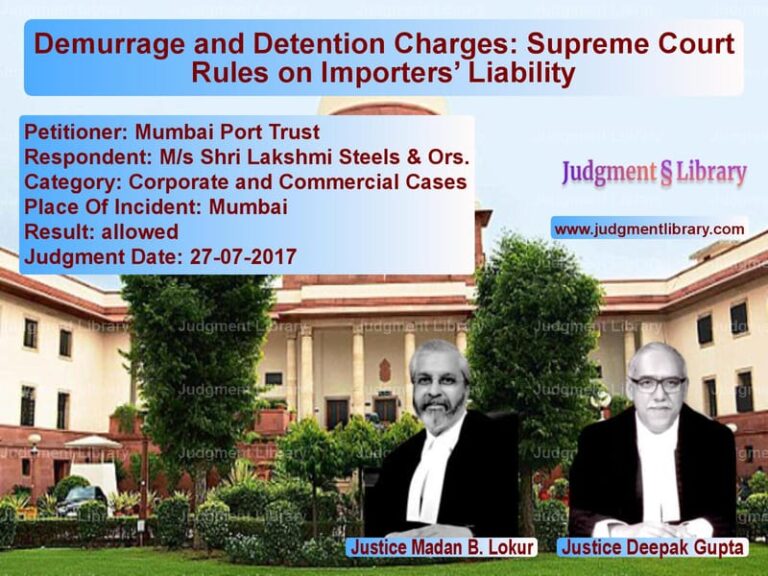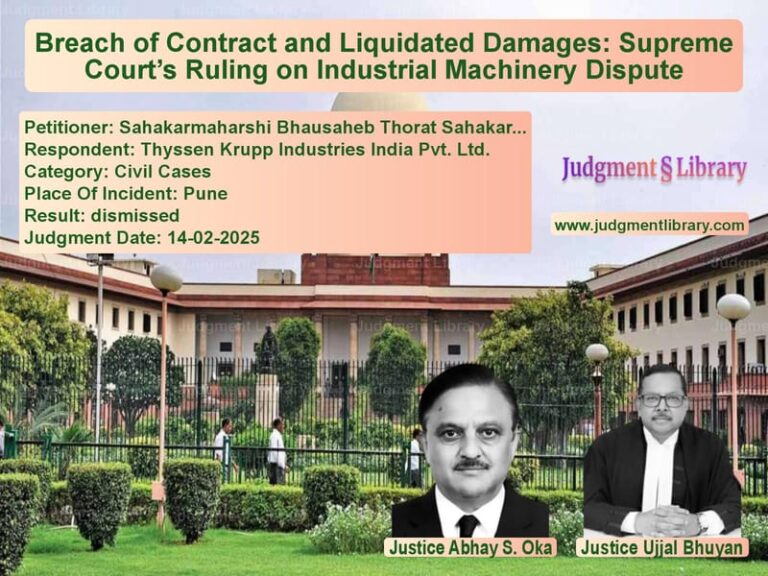Quashing of Criminal Conviction: Supreme Court Uses Article 142 for Amicable Settlement
The Supreme Court of India recently delivered a significant judgment in the case of Suraj Singh Gujar & Anr. vs. The State of Madhya Pradesh & Ors., wherein the Court invoked its extraordinary powers under Article 142 of the Constitution to quash a criminal conviction arising from a family dispute. The ruling underscores the principle that courts can consider amicable settlements in criminal cases when they involve minor offenses and do not significantly impact society.
The decision comes as a major relief for the appellants, who had been convicted under Sections 323, 324, and 325 read with Section 34 of the Indian Penal Code (IPC) and sentenced to three months, six months, and one year of rigorous imprisonment, respectively. The Supreme Court, after reviewing the compromise between the parties, set aside the conviction and allowed the appeal.
Background of the Case
The dispute arose on May 20, 2011, in a village in Madhya Pradesh when a minor altercation occurred between close relatives regarding a piece of land. The complainant (respondent no. 2) was tying bullocks on the disputed land, to which the appellants objected, claiming ownership. This led to a physical confrontation, resulting in injuries.
Following the incident:
- An FIR was lodged, leading to criminal prosecution.
- The Trial Court convicted the appellants under Sections 323, 324, and 325 IPC.
- The Madhya Pradesh High Court upheld the conviction.
- The convicted individuals approached the Supreme Court, citing a compromise deed dated January 29, 2024, between the parties.
Legal Issues Considered
The Supreme Court examined the following key legal aspects:
- Whether the conviction should be quashed based on a compromise between the parties.
- Whether the offense under Section 324 IPC, which is non-compoundable, can be quashed using the Court’s inherent powers.
- The impact of the crime on society and whether it warranted judicial intervention despite the compromise.
Arguments by the Appellants
The appellants, represented by their legal counsel, argued that:
- Both parties were close relatives (uncle and nephew), and the dispute arose from a family matter.
- The conflict was resolved amicably with the intervention of elders.
- The injured parties had tendered an unconditional apology and agreed to forgive the appellants.
- As per the compromise, both parties pledged to maintain peace and harmony in the village.
- Since Sections 323 and 325 IPC are compoundable offenses, the conviction under these provisions should be quashed.
- Even though Section 324 IPC is non-compoundable, the Supreme Court has the power to quash convictions in exceptional cases.
Arguments by the State
The State of Madhya Pradesh opposed the plea, arguing:
- The conviction was based on medical evidence, showing that the injuries were serious.
- The offense under Section 324 IPC is non-compoundable and should not be quashed.
- The High Court had already upheld the conviction after due consideration of the evidence.
- Allowing such compromises in criminal cases may set a wrong precedent.
Supreme Court’s Observations
The Supreme Court extensively discussed previous rulings on the quashing of criminal convictions through compromise and made the following key observations:
1. Extraordinary Powers under Article 142
The Court referred to its inherent powers under Article 142 of the Constitution, stating:
“Courts cannot grant permission to compound non-compoundable offenses, except under extraordinary circumstances where justice demands intervention.”
2. Judicial Precedents on Compromise in Criminal Cases
The Court cited several landmark cases, including:
- Ramgopal & Anr. vs. State of M.P (2022) 14 SCC 531: This case established that compromise can be considered even in non-compoundable offenses if it meets certain conditions.
- Ramawatar vs. State of M.P (2022) 13 SCC 635: The Supreme Court quashed a non-compoundable offense where the parties had amicably settled.
3. Nature of the Offense and Societal Impact
The Court emphasized that:
“This is a dispute between family members over a minor land issue, and there is no significant impact on society. Since the parties have reached an amicable resolution, we find it appropriate to set aside the conviction.”
4. Compromise Must Be Genuine and Voluntary
The Court verified that the compromise was voluntary and not obtained under coercion.
Final Judgment
The Supreme Court ruled:
- The conviction of the appellants is set aside.
- The appellants, who were out on bail, need not surrender.
- The appeal is allowed and all related applications are disposed of.
Implications of the Judgment
This judgment has far-reaching implications for criminal jurisprudence:
- Recognition of Amicable Settlements: Courts can quash criminal convictions when both parties reach a fair and voluntary compromise.
- Clarification on Non-Compoundable Offenses: Though non-compoundable offenses cannot be quashed under normal circumstances, the Supreme Court can intervene in exceptional cases.
- Precedent for Family Disputes: The ruling reinforces that courts can adopt a lenient view when criminal cases arise from personal or family disputes.
- Encouragement for Restorative Justice: The decision promotes the principle of reconciliation over punishment in minor criminal matters.
The Supreme Court’s ruling in Suraj Singh Gujar & Anr. vs. The State of Madhya Pradesh & Ors. sets a crucial precedent for handling criminal cases involving family disputes. It ensures that minor altercations do not lead to long-term criminal records when the affected parties have amicably resolved their differences.
Petitioner Name: Suraj Singh Gujar & Anr..Respondent Name: The State of Madhya Pradesh & Ors..Judgment By: Justice Sudhanshu Dhulia, Justice Ahsanuddin Amanullah.Place Of Incident: Madhya Pradesh.Judgment Date: 29-08-2024.
Don’t miss out on the full details! Download the complete judgment in PDF format below and gain valuable insights instantly!
Download Judgment: suraj-singh-gujar-&-vs-the-state-of-madhya-supreme-court-of-india-judgment-dated-29-08-2024.pdf
Directly Download Judgment: Directly download this Judgment
See all petitions in Bail and Anticipatory Bail
See all petitions in Fraud and Forgery
See all petitions in Legal Malpractice
See all petitions in Judgment by Sudhanshu Dhulia
See all petitions in Judgment by Ahsanuddin Amanullah
See all petitions in allowed
See all petitions in Quashed
See all petitions in supreme court of India judgments August 2024
See all petitions in 2024 judgments
See all posts in Criminal Cases Category
See all allowed petitions in Criminal Cases Category
See all Dismissed petitions in Criminal Cases Category
See all partially allowed petitions in Criminal Cases Category







